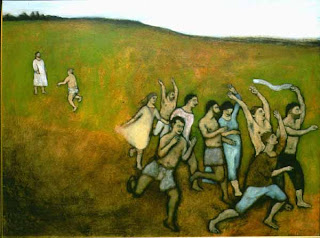
John was in prison.
Why? Because John the Baptist dared to tell Herod that it was wrong for him to take his brother’s wife and make her his own wife. Herod didn’t like that and so he put him in prison. What does this say about John the Baptist? That he was brave. That he was not afraid of calling a spade, a spade even if it landed him in prison.
He sent his disciples to Jesus with this question,“Are you the one who is to come, or should we look for another?”
When John spoke about the Messiah, he spoke about the ax that is ready to cut down the trees that did not bear fruit. He spoke about burning the useless chaff. In other words, he thought the Messiah would come to punish sinners.
And when Jesus came to be baptized, John the Baptist pointed him out as the Lamb of God.
But when Jesus began his public ministry, he did not act the way John the Baptist expected him to act. Instead of being hard on sinners, he was welcoming towards them.
So John sent his disciples to Jesus to find out if he really was the Messiah.
“Go and tell John what you hear and see: the blind regain their sight, the lame walk, lepers are cleansed, the deaf hear, the dead are raised, and the poor have the good news proclaimed to them.”
The answer of Jesus was a quotation from the Prophet Isaiah. In that passage, Isaiah described how the time of the Messiah would look like. And in fact, Jesus was doing just that. In other words, Jesus was telling John the Baptist that he was indeed the Messiah.
And blessed is the one who takes no offense at me.
And Jesus adds this sentence. What he means is that John should not lose faith in him just because Jesus did not fit his expectations about the Messiah,
As they were going off, Jesus began to speak to the crowds about John, “Then why did you go out? To see a prophet? Yes, I tell you, and more than a prophet. Amen, I say to you, among those born of women there has been none greater than John the Baptist; yet the least in the kingdom of heaven is greater than he.”
John the Baptist was the last and the greatest of the Prophets. Why? Because he was the one given the privilege of announcing the nearness of the Kingdom. Although that is the case, those who are part of the kingdom of heaven is greater than he. Why? Because belonging to the Kingdom is a greater privilege.
LESSONS
1. Jesus spoke well about John the Baptist before the people.
How often do we speak ill about people? Someone gives this advice. If you’ve got nothing good to say about someone, just keep quiet.
Do you know that if somebody has done something bad we are not allowed to spread the news to other people? It is sinful. Once upon a time someone went to St. Philip Neri and confessed that she had spread around the bad things that a neighbour had done. For penance, St. Philip told her to bring the feathers of a dressed chicken on top of a hill and throw them into the winds. Then she should go back to him. She did her penance and went back to St. Philip. He then told the woman to go back up the hill and gather the feathers. The woman protested that it was impossible to do that.
2. John expected the Messiah to act in a certain way. But Jesus acted in a different way. Jesus tells John to continue believing in him in spite of that.
God’s ways are not our ways. Many times we can’t understand why God acted in a way that is different from our expectations. When that happens, God asks us to continue believing just as Jesus asked John to continue believing in him. Why? Because God knows what he is doing.
For example, many years ago, I was working in a place called Joriz. One weekend I was invited to the birthday celebration of the first child of a young couple. It was his first birthday. The following weekend when I passed by their barong-barong I saw lights inside. There was a small coffin. The baby had died! Why should God allow an innocent baby to die? I don’t know. It seems unfair. We just have to believe that God knows what he is doing.
3. John’s role was to prepare the way of Jesus. He did that by preaching: “Repent, for the kingdom of heaven is at hand.”
In the gospel, the Greek word for repentance is “metanoia”. Metanoia means a change of mind, a change of heart. In other words, repentance must come from within. And because something has happened inside us, something will have to happen outside us. In other words, the change in behaviour outside must be the result of a change of mind and heart.
I read in the newspaper the story of a young man. He comes from the province and his family sent him to
What will make Christmas a meaningful religious event? When we are able to bring about a change in behaviour that springs from a change of mind and a change of heart.
The Salesians of Don Bosco is a religious congregation of priests and brothers dedicated to the welfare of the young. If you feel called by God to give your life for the good of the young, you may want help in discovering if this is really God's will for you. Please get in touch with the Vocation Director (Don Bosco North Province, Philippines) - 0917-7930112 - finvoc@yahoo.com - Bro. MON CALLO SDB.













